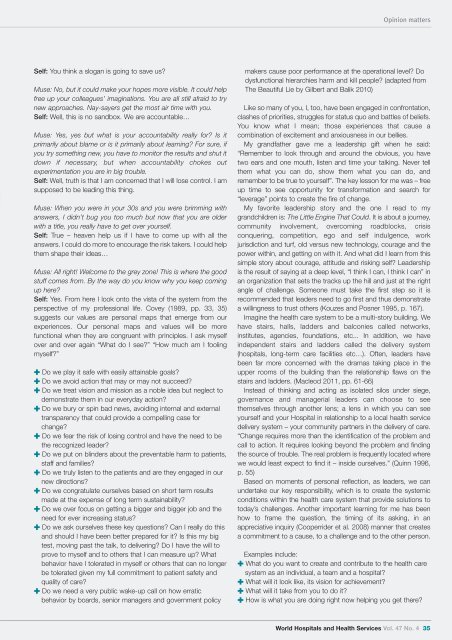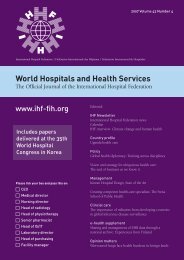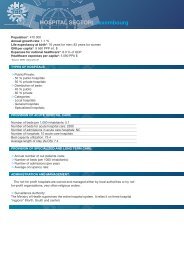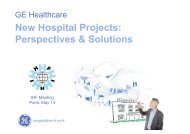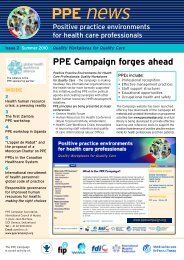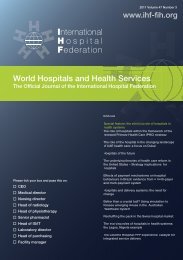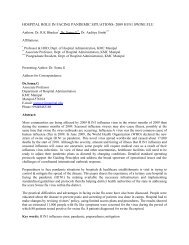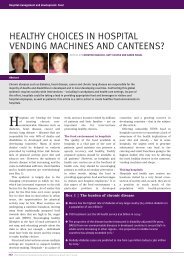web_vol47 4.pdf - International Hospital Federation
web_vol47 4.pdf - International Hospital Federation
web_vol47 4.pdf - International Hospital Federation
Create successful ePaper yourself
Turn your PDF publications into a flip-book with our unique Google optimized e-Paper software.
Opinion matters<br />
Self: You think a slogan is going to save us?<br />
Muse: No, but it could make your hopes more visible. It could help<br />
free up your colleagues’ imaginations. You are all still afraid to try<br />
new approaches. Nay-sayers get the most air time with you.<br />
Self: Well, this is no sandbox. We are accountable…<br />
Muse: Yes, yes but what is your accountability really for? Is it<br />
primarily about blame or is it primarily about learning? For sure, if<br />
you try something new, you have to monitor the results and shut it<br />
down if necessary, but when accountability chokes out<br />
experimentation you are in big trouble.<br />
Self: Well, truth is that I am concerned that I will lose control. I am<br />
supposed to be leading this thing.<br />
Muse: When you were in your 30s and you were brimming with<br />
answers, I didn’t bug you too much but now that you are older<br />
with a title, you really have to get over yourself.<br />
Self: True – heaven help us if I have to come up with all the<br />
answers. I could do more to encourage the risk takers. I could help<br />
them shape their ideas…<br />
Muse: All right! Welcome to the grey zone! This is where the good<br />
stuff comes from. By the way do you know why you keep coming<br />
up here?<br />
Self: Yes. From here I look onto the vista of the system from the<br />
perspective of my professional life. Covey (1989, pp. 33, 35)<br />
suggests our values are personal maps that emerge from our<br />
experiences. Our personal maps and values will be more<br />
functional when they are congruent with principles. I ask myself<br />
over and over again “What do I see?” “How much am I fooling<br />
myself?”<br />
✚ Do we play it safe with easily attainable goals?<br />
✚ Do we avoid action that may or may not succeed?<br />
✚ Do we treat vision and mission as a noble idea but neglect to<br />
demonstrate them in our everyday action?<br />
✚ Do we bury or spin bad news, avoiding internal and external<br />
transparency that could provide a compelling case for<br />
change?<br />
✚ Do we fear the risk of losing control and have the need to be<br />
the recognized leader?<br />
✚ Do we put on blinders about the preventable harm to patients,<br />
staff and families?<br />
✚ Do we truly listen to the patients and are they engaged in our<br />
new directions?<br />
✚ Do we congratulate ourselves based on short term results<br />
made at the expense of long term sustainability?<br />
✚ Do we over focus on getting a bigger and bigger job and the<br />
need for ever increasing status?<br />
✚ Do we ask ourselves these key questions? Can I really do this<br />
and should I have been better prepared for it? Is this my big<br />
test, moving past the talk, to delivering? Do I have the will to<br />
prove to myself and to others that I can measure up? What<br />
behavior have I tolerated in myself or others that can no longer<br />
be tolerated given my full commitment to patient safety and<br />
quality of care?<br />
✚ Do we need a very public wake-up call on how erratic<br />
behavior by boards, senior managers and government policy<br />
makers cause poor performance at the operational level? Do<br />
dysfunctional hierarchies harm and kill people? (adapted from<br />
The Beautiful Lie by Gilbert and Balik 2010)<br />
Like so many of you, I, too, have been engaged in confrontation,<br />
clashes of priorities, struggles for status quo and battles of beliefs.<br />
You know what I mean; those experiences that cause a<br />
combination of excitement and anxiousness in our bellies.<br />
My grandfather gave me a leadership gift when he said:<br />
“Remember to look through and around the obvious, you have<br />
two ears and one mouth, listen and time your talking. Never tell<br />
them what you can do, show them what you can do, and<br />
remember to be true to yourself”. The key lesson for me was – free<br />
up time to see opportunity for transformation and search for<br />
“leverage” points to create the fire of change.<br />
My favorite leadership story and the one I read to my<br />
grandchildren is: The Little Engine That Could. It is about a journey,<br />
community involvement, overcoming roadblocks, crisis<br />
conquering, competition, ego and self indulgence, work<br />
jurisdiction and turf, old versus new technology, courage and the<br />
power within, and getting on with it. And what did I learn from this<br />
simple story about courage, attitude and risking self? Leadership<br />
is the result of saying at a deep level, “I think I can, I think I can” in<br />
an organization that sets the tracks up the hill and just at the right<br />
angle of challenge. Someone must take the first step so it is<br />
recommended that leaders need to go first and thus demonstrate<br />
a willingness to trust others (Kouzes and Posner 1995, p. 167).<br />
Imagine the health care system to be a multi-story building. We<br />
have stairs, halls, ladders and balconies called networks,<br />
institutes, agencies, foundations, etc... In addition, we have<br />
independent stairs and ladders called the delivery system<br />
(hospitals, long-term care facilities etc…). Often, leaders have<br />
been far more concerned with the dramas taking place in the<br />
upper rooms of the building than the relationship flaws on the<br />
stairs and ladders. (Macleod 2011, pp. 61-66)<br />
Instead of thinking and acting as isolated silos under siege,<br />
governance and managerial leaders can choose to see<br />
themselves through another lens; a lens in which you can see<br />
yourself and your <strong>Hospital</strong> in relationship to a local health service<br />
delivery system – your community partners in the delivery of care.<br />
“Change requires more than the identification of the problem and<br />
call to action. It requires looking beyond the problem and finding<br />
the source of trouble. The real problem is frequently located where<br />
we would least expect to find it – inside ourselves.” (Quinn 1996,<br />
p. 55)<br />
Based on moments of personal reflection, as leaders, we can<br />
undertake our key responsibility, which is to create the systemic<br />
conditions within the health care system that provide solutions to<br />
today’s challenges. Another important learning for me has been<br />
how to frame the question, the timing of its asking, in an<br />
appreciative inquiry (Cooperrider et al. 2008) manner that creates<br />
a commitment to a cause, to a challenge and to the other person.<br />
Examples include:<br />
✚ What do you want to create and contribute to the health care<br />
system as an individual, a team and a hospital?<br />
✚ What will it look like, its vision for achievement?<br />
✚ What will it take from you to do it?<br />
✚ How is what you are doing right now helping you get there?<br />
World <strong>Hospital</strong>s and Health Services Vol. 47 No. 4 35


